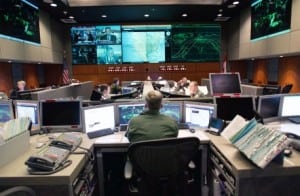Lockheed Martin Receives $3.9M Contract to Track Orbital Debris
[Via Satellite 01-09-2014] Lockheed Martin will continue tracking and sharing data on orbiting space assets and debris through a $3.9 million contract from the United States Air Force Life Cycle Management Center. Under this contract, Lockheed Martin will continue to develop the Non-Traditional Data Pre-Processor (NDPP) under the Integrated Space Command and Control (ISC2) contract.
The NDPP system is an expansion of the ISC2 space data server, and it extends the communications infrastructure allowing operators to share data between sensor and satellite sources around the world with the Joint Space Operations Center (JSpOC) at Vandenberg Air Force Base. In addition to giving air and missile warning information, ISC2 provides space situational awareness to the U.S. Strategic Command (USSTRATCOM) and Air Force Space Command, using inputs from the Space Surveillance Network to accurately track and catalog more than 23,000 space objects.
The NDPP is a key step forward in exposing data in support of the protection of valuable space assets like the International Space Station (ISS). In 2009, the Iridium 33 communications satellite and Russia’s Kosmos 2251 military satellite collided creating a large amount of space debris. Since that time, government and commercial organizations around the globe have been working to improve space object tracking through improved collaboration.
“The cars we drive on Earth have mirrors and sensors to prevent bumps and scrapes, but if you’re trying to avoid rapidly moving debris in space, you’ll need enhanced situational awareness,” said Rob Smith, vice president of command, control, communications, computers, intelligence, surveillance and reconnaissance systems with Lockheed Martin Integrated Systems and Global Solutions. “Space has no national borders so it’s important to share collected data to protect all the space assets currently orbiting the planet.”
